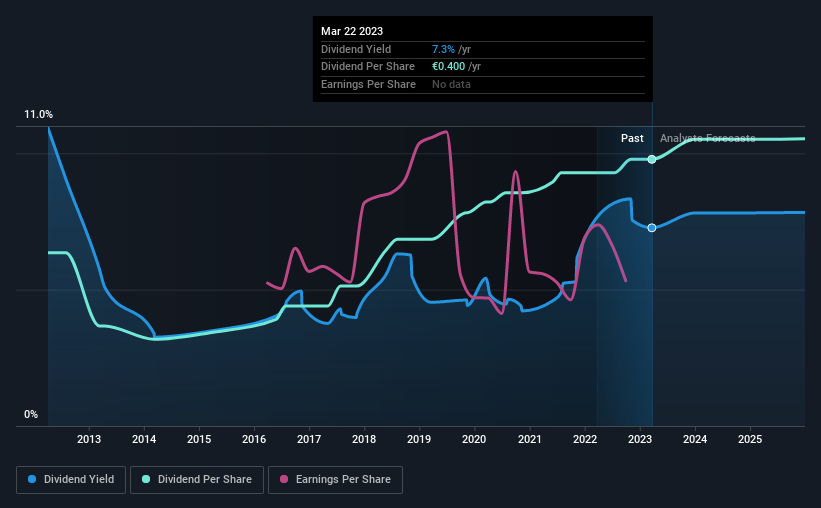- Italy
- /
- Electric Utilities
- /
- BIT:ENEL
Enel (BIT:ENEL) Has Announced That It Will Be Increasing Its Dividend To €0.20

Enel SpA (BIT:ENEL) will increase its dividend from last year's comparable payment on the 26th of July to €0.20. This will take the annual payment to 7.3% of the stock price, which is above what most companies in the industry pay.
View our latest analysis for Enel
Enel's Payment Has Solid Earnings Coverage
A big dividend yield for a few years doesn't mean much if it can't be sustained. Prior to this announcement, the dividend made up 161% of earnings, and the company was generating negative free cash flows. Paying out such a large dividend compared to earnings while also not generating free cash flows is a major warning sign for the sustainability of the dividend as these levels are certainly a bit high.
Looking forward, earnings per share is forecast to rise by 164.2% over the next year. Under the assumption that the dividend will continue along recent trends, we think the payout ratio could be 70% which would be quite comfortable going to take the dividend forward.

Dividend Volatility
Although the company has a long dividend history, it has been cut at least once in the last 10 years. The dividend has gone from an annual total of €0.26 in 2013 to the most recent total annual payment of €0.40. This works out to be a compound annual growth rate (CAGR) of approximately 4.4% a year over that time. We're glad to see the dividend has risen, but with a limited rate of growth and fluctuations in the payments the total shareholder return may be limited.
Dividend Growth May Be Hard To Achieve
Growing earnings per share could be a mitigating factor when considering the past fluctuations in the dividend. Although it's important to note that Enel's earnings per share has basically not grown from where it was five years ago, which could erode the purchasing power of the dividend over time. So the company has struggled to grow its EPS yet it's still paying out 161% of its earnings. Limited recent earnings growth and a high payout ratio makes it hard for us to envision strong future dividend growth, unless the company should have substantial pricing power or some form of competitive advantage.
The Dividend Could Prove To Be Unreliable
Overall, we always like to see the dividend being raised, but we don't think Enel will make a great income stock. The track record isn't great, and the payments are a bit high to be considered sustainable. We would be a touch cautious of relying on this stock primarily for the dividend income.
Market movements attest to how highly valued a consistent dividend policy is compared to one which is more unpredictable. Still, investors need to consider a host of other factors, apart from dividend payments, when analysing a company. Case in point: We've spotted 4 warning signs for Enel (of which 2 are a bit concerning!) you should know about. Looking for more high-yielding dividend ideas? Try our collection of strong dividend payers.
Valuation is complex, but we're here to simplify it.
Discover if Enel might be undervalued or overvalued with our detailed analysis, featuring fair value estimates, potential risks, dividends, insider trades, and its financial condition.
Access Free AnalysisHave feedback on this article? Concerned about the content? Get in touch with us directly. Alternatively, email editorial-team (at) simplywallst.com.
This article by Simply Wall St is general in nature. We provide commentary based on historical data and analyst forecasts only using an unbiased methodology and our articles are not intended to be financial advice. It does not constitute a recommendation to buy or sell any stock, and does not take account of your objectives, or your financial situation. We aim to bring you long-term focused analysis driven by fundamental data. Note that our analysis may not factor in the latest price-sensitive company announcements or qualitative material. Simply Wall St has no position in any stocks mentioned.
About BIT:ENEL
Enel
Operates as an integrated operator in electricity and gas industries worldwide.
Solid track record established dividend payer.
Similar Companies
Market Insights
Community Narratives



